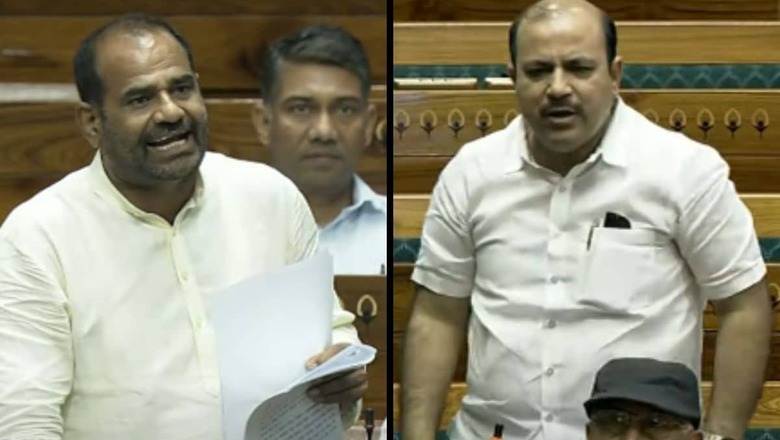
views
In a shocking and deplorable turn of events, Bharatiya Janata Party (BJP) Member of Parliament, Ramesh Bidhuri, ignited a firestorm of controversy by hurling religious slurs and hateful phrases at fellow Lok Sabha member, Danish Ali of the Bahujan Samaj Party (BSP), during a momentous session in the new Parliament building this week. Such reprehensible behaviour, within the hallowed halls of India’s parliamentary institution, stands as a grave affront to the very essence of democracy and the values it upholds. It is imperative that we collectively condemn this act and emphasise that in a sacred place like the Parliament of India, where the most vital issues concerning the nation are deliberated upon, there should be no room for unparliamentary or abusive language. However, let us not forget that the Opposition, too, has not been entirely free from such disgraceful conduct.
Trinamool Congress (TMC) MP Mahua Moitra launched a scathing attack on a prominent industrialist, widely understood to be Adani, and by extension, Prime Minister Modi, in the wake of the Hindenburg report. Accusing the billionaire businessman of taking the nation for a ride, Moitra, without explicitly naming Adani, wielded words like a sword, insinuating that a certain ‘A’ to ‘I,’ who was not Advani, exuded the stench of crony capitalism, leaving the nation duped. However, her impassioned speech did not end there, as it quickly ignited a fiery exchange between TMC and BJP members. Moitra, unfortunately, did not temper her language, leading the Chair to object and implore members to refrain from the use of cuss words. What followed, though, was equally disheartening as Mahua Moitra directed unparliamentary language towards BJP MP Ramesh Bidhuri and called him “harami” which means “bastard”.
The demand for an apology from BJP MPs was swift, but Moitra’s response was anything but remorseful. In an audacious stance, she defended her words, challenging the very notion of parliamentary etiquette. It is indeed ironic that Mahua Moitra, who once used unparliamentary language and defended her actions, is now the first one to criticise the BJP for allowing communal slurs and is demanding strict action.
As the political arena resounds with accusations and counter-accusations, it becomes increasingly pertinent to question the Opposition’s stance when the ball is squarely in their court. The recent incident involving BJP MP Ramesh Bidhuri’s condemnable remarks must indeed be met with stern censure. However, it is essential to remember that this is not an isolated occurrence. The Opposition, too, has played its part in the theatre of derogatory remarks. In response to the situation, BJP’s spokesperson Amit Malviya argued that Bidhuri’s comments in the Lok Sabha were provoked by Danish Ali’s name-calling of the prime minister. The echoes of “neech” casteist jibes were used by Danish Ali but also from the Congress camp, as exemplified by Manishankar Aiyar’s infamous statement about Prime Minister Modi.
When the Opposition indulges in similar vitriolic language, it becomes evident that the pot is calling the kettle black. In these instances, it is not just a question of condemning actions, but of acknowledging that the Opposition often digs its own hole, thereby diminishing the moral high ground they seek to occupy.
In a “secular” India where the bedrock principles of justice and equality are held sacred, a chilling incident unfolded, leaving the nation grappling with questions about the even-handedness of our legal system. It was a day when the air was thick with tension, and the echoes of provocative rhetoric reverberated through the streets. In the heart of Maharashtra’s Marathwada region, AIMIM MP Imtiaz Jaleel took to the stage in what he termed an “unplanned and spontaneous protest rally.” The gathering was in response to the heated controversy surrounding Nupur Sharma, the now-suspended national spokesperson of the BJP. Sharma had found herself in the midst of a firestorm of condemnation for her remarks in a live TV debate, remarks that had targeted Islam and its followers.
But what transpired next would send shockwaves through the nation. Imtiaz Jaleel, standing before a fervent crowd, did not merely seek to express dissent or disagreement. Instead, in an incendiary address, he issued a harrowing call to action. His words, dripping with anger, cut through the charged atmosphere: “Nupur Sharma should be hanged in Aurangabad.”
The crowd, already primed with emotion, erupted in response to Jaleel’s inflammatory rhetoric. Chants of “Sar Tan Se Juda” and “phasi” filled the air, as the impassioned assembly seemed to embrace the idea of a public execution. In those tense moments, the very fabric of a nation founded on the principles of secularism and justice appeared to be unravelling, leaving us to ponder the ramifications of such an alarming turn of events.
In a twist of bitter irony, it’s the very same party that once incited a mob, whose chief, Asaduddin Owaisi, is now reacting to Ramesh Bidhuri’s controversial comments with a grim warning. Owaisi declared, “The day is not far when a Muslim will be mob-lynched in Parliament.”
These events remind us that the line between civility and chaos must be drawn firmly, condemning reprehensible acts both inside and outside the Parliament. These politicians and influential figures may present themselves as flagbearers of truth, but their actions reveal a disturbing game of selective fairness. They seem to possess an eerie ability to ignite the fires of violence. In a world where truth and justice should be paramount, their actions and silence paint a disheartening picture, showing that they are more adept at perpetuating discord than fostering genuine understanding and harmony.
While our constitution safeguards free speech for MPs and MLAs, it’s vital to remember that with great power comes great responsibility. We, as citizens, must acknowledge that we need better politics and any environment that fosters irresponsible speech or turns a blind eye to corruption must be dismantled. It is, first and foremost, our collective responsibility as citizens and the choices we make in the realm of politics. When entrusted with power, we must remember that its purpose is not for misuse, but to serve the greater good of our democracy, a truth universally acknowledged that we must uphold and cherish.
When wrongdoing occurred within, the BJP acted swiftly, issuing a show-cause notice to Bidhuri. However, the question lingers: What about the Opposition? It’s imperative to stress that all such actions, regardless of political affiliation, are condemnable. In the pursuit of a responsible political landscape, there’s no partiality in denouncing actions that undermine our democracy.
The author is a practising Advocate. She writes article on women’s rights, politics and law. Views expressed in the above piece are personal and solely that of the author. They do not necessarily reflect News18’s views.




















Comments
0 comment